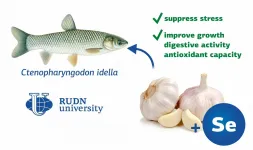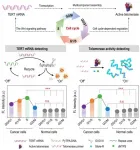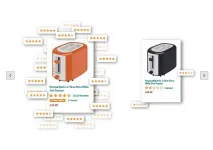Repeated testing for COVID-19 is vital, economic and public health analysis shows
2021-02-05
(Press-News.org) As a new presidential administration takes steps to examine options to control the spread of COVID-19 through increased testing, epidemiologists at The University of Texas at Austin and other institutions have a new analysis that shows the value of having all people in the U.S. tested on a regular, rotating basis to slow the spread of the novel coronavirus and the loss of life from COVID-19. The team's model is outlined in a paper published online today in The Lancet Public Health.
With the introduction of accurate and inexpensive rapid tests, researchers say there is an optimal testing schedule that minimizes costs as well as the loss of life and economic damage from hospitalizations and quarantine in different regions, based on the rate at which the virus is spreading.
"The question is, how do the costs and benefits play out?" said Lauren Ancel Meyers, director of the UT Austin COVID-19 Modeling Consortium and the corresponding author of the paper. "So, we built this model that incorporates not just the epidemiology, but also the economic implications."
For areas where the virus is spreading quickly, the model found that testing everyone in the community once a week and requiring those who test positive to isolate for two weeks had the greatest benefit to public health and economic considerations.
For communities with moderate transmission rates, the model suggests testing everyone every two weeks and isolating positive cases for one week. For communities with low spread, testing could be conducted monthly and positive cases could isolate for one week.
"Almost across the board, it makes sense to be ramping up our testing efforts in the United States, even though there may be intimidating upfront costs," Meyers said. "We will save enough lives and prevent enough hospitalizations that economically, in the big picture, we will be better off."
The new model does not explicitly include the introduction of vaccines, which are becoming available across the US. But Meyers notes that as segments of a community become vaccinated, the spread of the disease may slow and the population of people that can become seriously ill will drop.
"The model does consider different rates of transmission and adherence to isolation guidance," Meyers said. "In general, the faster the virus is spreading, the more frequently we should be testing, and the longer we should stay in isolation. The slower it's spreading, the less testing we have to do, and the faster we can get out of isolation and quarantine."
Just as vaccinations are important for getting the pandemic under control, testing is critical, especially with the spread of new highly transmissible variants of the virus, the researchers indicated. Although this is not the first study to suggest that ramping up rapid testing is essential to slowing transmission, it is the first to examine from a high level the cost-benefit economic analysis.
INFORMATION:
Funding for the study was provided by the National Institutes of Health, the U.S. Centers for Disease Control and Prevention and Tito's Handmade Vodka. Abhishek Pandey and Alison P. Galvani of the Yale School of Public Health; Zhanwei Du, Yuan Bai and Benjamin J. Cowling of the University of Hong Kong; Meagan C. Fitzpatrick of Yale University and The University of Maryland; Matteo Chinazzi, Alessandro Vespignani and Ana Pastore y Piontti of Northeastern University; and Michael Lachmann of the Santa Fe Institute also contributed to the research.
ELSE PRESS RELEASES FROM THIS DATE:
2021-02-05
Weekly COVID-19 testing, with two-week isolation of positive cases, is the most cost-effective strategy to mitigate spread of the virus in the USA when transmission is high in affected areas until vaccines are widely available.
When transmission rates are low to moderate, monthly testing and a one-week isolation period is the most cost-effective approach.
Monthly population testing is more cost-effective than the current strategy of testing only people showing symptoms and their close contacts.
Weekly COVID-19 testing, coupled with a two-week isolation period for positive cases, may be the most cost-effective strategy to tackle the ...
2021-02-04
A biologist from RUDN University confirmed that selenium nanoparticles and garlic extract can effectively reduce the negative impact of stress on the health of grass carp in the breeding industry. The results of his study were published in the Journal of the World Aquaculture Society.
Grass carp or Ctenopharyngodon Idella is a valuable commercial fish type. In order to increase productivity, fish farms tend to breed more and more fish in small reservoirs. This extreme population density causes stress in carps that negatively affects their health, namely, reduces immunity, slows down growth, suppresses digestion, and interferes with intestinal functions. To mitigate ...
2021-02-04
Cancer is a significant cause of death worldwide and many efforts have been devoted to the development of methods for early detection. Telomerase are considered as a tumor biomarker for early diagnosis because the telomerase of more than 80% immortalized cells are reactivated and provides the sustained proliferative capacity of these cells, but the telomerase activity are not detectable in normal somatic cells. Telomerase is a ribonucleoprotein complex that is thought to add telomeric repeats onto the ends of chromosomes during the replicative phase (S ...
2021-02-04
DETROIT - Wayne State University School of Medicine researchers have reported that zinc supplements for men and women attempting to conceive either naturally or through assisted reproduction during the COVID-19 pandemic may prevent mitochondrial damage in young egg and sperm cells, as well as enhance immunity against the virus.
In "Potential Role of Zinc in the COVID-19 Disease Process and its Probable Impact on Reproduction," published in Reproductive Sciences, Husam Abu-Soud, Ph.D., associate professor of Obstetrics and Gynecology and the C.S. Mott Center for Growth and Development, ...
2021-02-04
Sexual assault and sexual harassment are significant problems in the U.S. military and military service academies in the United States. In 2018, 15.8% of female and 2.4% of male cadets and midshipmen across the military service academies reported unwanted sexual contact in the past year. This unwanted behavior can contribute to a variety of negative mental and behavioral health outcomes.
While the military service academies have implemented multiple sexual assault prevention programs and social marketing campaigns to improve awareness of and response to sexual assault, prevention initiatives have been hindered by an absence of evidence ...
2021-02-04
Gun violence among children is lower in states with more gun laws, according to a Rutgers-led study.
The study, published in the Journal of Youth and Adolescence, examined youth gun and weapon carrying data from 2005 and 2017 across several states. Researchers found the rates of youths carrying guns was higher in states and lower in states with more gun laws. According to researchers, this phenomenon could be associated with large urban areas and more significant safety concerns within these areas.
Louisiana and Arkansas reported the highest percentages of youth reporting gun carrying behavior in 2017 and 2013 respectively, with 12.7 percent and 12.5 percent respectively. These two states had 13 gun laws in place while the lowest rates of gun carrying among ...
2021-02-04
If you're about to buy something online and its only customer review is negative, you'd probably reconsider the purchase, right? It turns out a product's first review can have an outsized effect on the item's future -- it can even cause the product to fail.
Shoppers, retailers and manufacturers alike feel the effects of customer reviews. Researchers at the University of Florida's Warrington College of Business looked at the influence of the first review after noticing the exact same products getting positive reviews on one retailer's website but negative reviews on others, said Sungsik Park, Ph.D., who studied the phenomenon ...
2021-02-04
COLUMBUS, Ohio - Considering the greater good by social distancing during a pandemic turns out to have an attractive personal benefit: A new study has found that staying away from others also reduces an individual person's chances of contracting COVID-19.
Researchers presented study participants with virtual behavior scenarios of various public settings - a grocery store, a crowded beach, a crosswalk - and asked them to place themselves or fictional people in those contexts based on their social distancing preferences.
Four months later, the participants were asked if they had tested positive for SARS-CoV-2 infection or otherwise believed they had been sick with a case of COVID-19.
Statistical analyses ...
2021-02-04
Scientists like the John A. Moran Eye Center's Paul S. Bernstein, MD, PhD, know a special class of lipids, or fatty acids, found in the retina of the eye and in just a few other parts of the body play an important role in maintaining vision.
But it's been difficult to study whether giving these lipids, called very-long-chain polyunsaturated fatty acids (VLC-PUFAs), to patients as a supplement could prevent blinding eye diseases like age-related macular degeneration, diabetic retinopathy, and some inherited retinal diseases. Made in the body by the ELOVL4 enzyme but rarely consumed as part of a normal diet, VLC-PUFAs weren't commercially available ...
2021-02-04
In nuclear physics so-called magic number are such nuclear proton and/or neutron numbers, for which the nucleus is more stable compared to neighboring isotopes on the nuclear chart. Researchers in both experimental and theoretical nuclear physics from University of Jyväskylä, Finland, took part of international research team, which studied the nuclear charge radii of potassium isotopes. Isotopes were studied by using the collinear resonance ionization spectroscopy technique. The results indicated that the potassium isotope with a neutron number of 32 does not conform with criteria of magic neutron number. The results were published in Nature Physics journal on January 2021.
Far from the stable ...
LAST 30 PRESS RELEASES:
[Press-News.org] Repeated testing for COVID-19 is vital, economic and public health analysis shows




